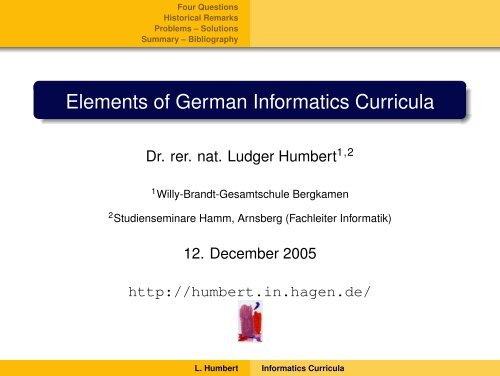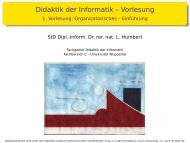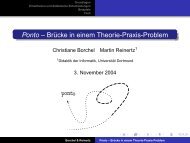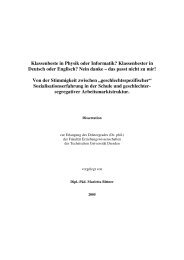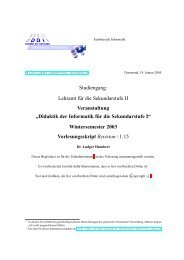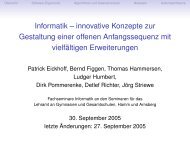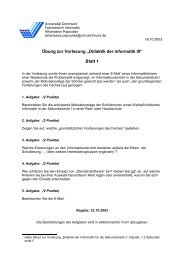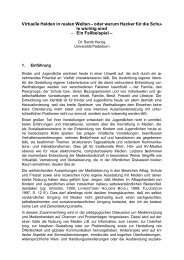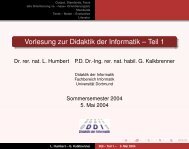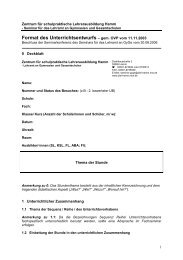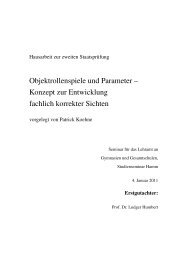Elements of German Informatics Curricula
Elements of German Informatics Curricula
Elements of German Informatics Curricula
Create successful ePaper yourself
Turn your PDF publications into a flip-book with our unique Google optimized e-Paper software.
Four Questions<br />
Historical Remarks<br />
Problems – Solutions<br />
Summary – Bibliography<br />
<strong>Elements</strong> <strong>of</strong> <strong>German</strong> <strong>Informatics</strong> <strong>Curricula</strong><br />
Dr. rer. nat. Ludger Humbert 1,2<br />
1 Willy-Brandt-Gesamtschule Bergkamen<br />
2 Studienseminare Hamm, Arnsberg (Fachleiter Informatik)<br />
12. December 2005<br />
http://humbert.in.hagen.de/<br />
L. Humbert <strong>Informatics</strong> <strong>Curricula</strong>
Outline<br />
Four Questions<br />
Historical Remarks<br />
Problems – Solutions<br />
Summary – Bibliography<br />
1 Questions<br />
The Beginning<br />
Research in Didactics in <strong>Informatics</strong><br />
2 Historical Remarks<br />
<strong>Elements</strong> <strong>of</strong> History – Recommendations<br />
1968–1973<br />
1976 – timeline<br />
1994–2005<br />
3 Problems – Solutions<br />
Status: not really solved<br />
Misunderstanding and General Approaches<br />
Situation in Northrhine-Westfalia (NW)<br />
4 Summary – Bibliography<br />
Summary<br />
Bibliography<br />
L. Humbert <strong>Informatics</strong> <strong>Curricula</strong>
Questions (1/4)<br />
Four Questions<br />
Historical Remarks<br />
Problems – Solutions<br />
Summary – Bibliography<br />
The Beginning<br />
Research in Didactics in <strong>Informatics</strong><br />
Why should <strong>Informatics</strong> be taught?<br />
In the beginning it was just the opinion <strong>of</strong> some teachers:<br />
the elements, which constitute the science informatics and<br />
enable us to build informatics systems are so fanscinating<br />
and different from other experiences, that pupils and<br />
students (like those teachers) will like it very much.<br />
Today you’ll find several (controversal) substantiations on<br />
this topic—the main element mentioned by the most <strong>of</strong><br />
them: Education should enable pupils and students to<br />
»drive the[ir] future«. If <strong>Informatics</strong> has a unique selling<br />
point, which is a nessacary element in education and no<br />
other subject can fulfill, then <strong>Informatics</strong> has to be<br />
mandatory [Klafki 1991, key qualifications (in <strong>German</strong>)].<br />
L. Humbert <strong>Informatics</strong> <strong>Curricula</strong>
Questions (1/4)<br />
Four Questions<br />
Historical Remarks<br />
Problems – Solutions<br />
Summary – Bibliography<br />
The Beginning<br />
Research in Didactics in <strong>Informatics</strong><br />
Why should <strong>Informatics</strong> be taught?<br />
In the beginning it was just the opinion <strong>of</strong> some teachers:<br />
the elements, which constitute the science informatics and<br />
enable us to build informatics systems are so fanscinating<br />
and different from other experiences, that pupils and<br />
students (like those teachers) will like it very much.<br />
Today you’ll find several (controversal) substantiations on<br />
this topic—the main element mentioned by the most <strong>of</strong><br />
them: Education should enable pupils and students to<br />
»drive the[ir] future«. If <strong>Informatics</strong> has a unique selling<br />
point, which is a nessacary element in education and no<br />
other subject can fulfill, then <strong>Informatics</strong> has to be<br />
mandatory [Klafki 1991, key qualifications (in <strong>German</strong>)].<br />
L. Humbert <strong>Informatics</strong> <strong>Curricula</strong>
Questions (1/4)<br />
Four Questions<br />
Historical Remarks<br />
Problems – Solutions<br />
Summary – Bibliography<br />
The Beginning<br />
Research in Didactics in <strong>Informatics</strong><br />
Why should <strong>Informatics</strong> be taught?<br />
In the beginning it was just the opinion <strong>of</strong> some teachers:<br />
the elements, which constitute the science informatics and<br />
enable us to build informatics systems are so fanscinating<br />
and different from other experiences, that pupils and<br />
students (like those teachers) will like it very much.<br />
Today you’ll find several (controversal) substantiations on<br />
this topic—the main element mentioned by the most <strong>of</strong><br />
them: Education should enable pupils and students to<br />
»drive the[ir] future«. If <strong>Informatics</strong> has a unique selling<br />
point, which is a nessacary element in education and no<br />
other subject can fulfill, then <strong>Informatics</strong> has to be<br />
mandatory [Klafki 1991, key qualifications (in <strong>German</strong>)].<br />
L. Humbert <strong>Informatics</strong> <strong>Curricula</strong>
Questions (2/4)<br />
Four Questions<br />
Historical Remarks<br />
Problems – Solutions<br />
Summary – Bibliography<br />
The Beginning<br />
Research in Didactics in <strong>Informatics</strong><br />
What to teach in <strong>Informatics</strong>?<br />
in the 60th:<br />
Boolean Algebra, von Neumann Principle<br />
construction <strong>of</strong> hardware elements (adder, coder, . . . )<br />
in the 70th:<br />
algorithms and data structures<br />
problem solving by »stepwise refinement« [Wirth 1971]<br />
»’go to’ considered harmful« [Dijkstra 1968]<br />
in the 80th:<br />
standard algorithms (searching and sorting) [Knuth 1973]<br />
some nonprocedural languages were tested<br />
»A potporri <strong>of</strong> some well known elements does not<br />
constitute a curriculum« cf. [Nievergelt 1991]<br />
L. Humbert <strong>Informatics</strong> <strong>Curricula</strong>
Questions (2/4)<br />
Four Questions<br />
Historical Remarks<br />
Problems – Solutions<br />
Summary – Bibliography<br />
The Beginning<br />
Research in Didactics in <strong>Informatics</strong><br />
What to teach in <strong>Informatics</strong>?<br />
in the 60th:<br />
Boolean Algebra, von Neumann Principle<br />
construction <strong>of</strong> hardware elements (adder, coder, . . . )<br />
in the 70th:<br />
algorithms and data structures<br />
problem solving by »stepwise refinement« [Wirth 1971]<br />
»’go to’ considered harmful« [Dijkstra 1968]<br />
in the 80th:<br />
standard algorithms (searching and sorting) [Knuth 1973]<br />
some nonprocedural languages were tested<br />
»A potporri <strong>of</strong> some well known elements does not<br />
constitute a curriculum« cf. [Nievergelt 1991]<br />
L. Humbert <strong>Informatics</strong> <strong>Curricula</strong>
Questions (2/4)<br />
Four Questions<br />
Historical Remarks<br />
Problems – Solutions<br />
Summary – Bibliography<br />
The Beginning<br />
Research in Didactics in <strong>Informatics</strong><br />
What to teach in <strong>Informatics</strong>?<br />
in the 60th:<br />
Boolean Algebra, von Neumann Principle<br />
construction <strong>of</strong> hardware elements (adder, coder, . . . )<br />
in the 70th:<br />
algorithms and data structures<br />
problem solving by »stepwise refinement« [Wirth 1971]<br />
»’go to’ considered harmful« [Dijkstra 1968]<br />
in the 80th:<br />
standard algorithms (searching and sorting) [Knuth 1973]<br />
some nonprocedural languages were tested<br />
»A potporri <strong>of</strong> some well known elements does not<br />
constitute a curriculum« cf. [Nievergelt 1991]<br />
L. Humbert <strong>Informatics</strong> <strong>Curricula</strong>
Questions (2/4)<br />
Four Questions<br />
Historical Remarks<br />
Problems – Solutions<br />
Summary – Bibliography<br />
The Beginning<br />
Research in Didactics in <strong>Informatics</strong><br />
What to teach in <strong>Informatics</strong>?<br />
in the 60th:<br />
Boolean Algebra, von Neumann Principle<br />
construction <strong>of</strong> hardware elements (adder, coder, . . . )<br />
in the 70th:<br />
algorithms and data structures<br />
problem solving by »stepwise refinement« [Wirth 1971]<br />
»’go to’ considered harmful« [Dijkstra 1968]<br />
in the 80th:<br />
standard algorithms (searching and sorting) [Knuth 1973]<br />
some nonprocedural languages were tested<br />
»A potporri <strong>of</strong> some well known elements does not<br />
constitute a curriculum« cf. [Nievergelt 1991]<br />
L. Humbert <strong>Informatics</strong> <strong>Curricula</strong>
Questions (2/4)<br />
Four Questions<br />
Historical Remarks<br />
Problems – Solutions<br />
Summary – Bibliography<br />
The Beginning<br />
Research in Didactics in <strong>Informatics</strong><br />
What to teach in <strong>Informatics</strong>?<br />
in the 60th:<br />
Boolean Algebra, von Neumann Principle<br />
construction <strong>of</strong> hardware elements (adder, coder, . . . )<br />
in the 70th:<br />
algorithms and data structures<br />
problem solving by »stepwise refinement« [Wirth 1971]<br />
»’go to’ considered harmful« [Dijkstra 1968]<br />
in the 80th:<br />
standard algorithms (searching and sorting) [Knuth 1973]<br />
some nonprocedural languages were tested<br />
»A potporri <strong>of</strong> some well known elements does not<br />
constitute a curriculum« cf. [Nievergelt 1991]<br />
L. Humbert <strong>Informatics</strong> <strong>Curricula</strong>
Questions (3/4)<br />
Four Questions<br />
Historical Remarks<br />
Problems – Solutions<br />
Summary – Bibliography<br />
The Beginning<br />
Research in Didactics in <strong>Informatics</strong><br />
Which subject should those <strong>Elements</strong> belong to?<br />
Until today there are many teachers in mathematics and<br />
physics, which adopt that a whole bunch <strong>of</strong> those themes<br />
could be taught in their [primary] subject.<br />
Whom to teach <strong>Informatics</strong>?<br />
In the beginning many <strong>of</strong> us thought, that it is necessary to<br />
teach <strong>Informatics</strong> to all children, but we noticed that our<br />
society will increasingly depend on knowledge in<br />
informatics. But there are—up to this very day there are<br />
many obstacles for implementing a new mandatory subject<br />
in all schools. This remains to be worked at..<br />
L. Humbert <strong>Informatics</strong> <strong>Curricula</strong>
Questions (3/4)<br />
Four Questions<br />
Historical Remarks<br />
Problems – Solutions<br />
Summary – Bibliography<br />
The Beginning<br />
Research in Didactics in <strong>Informatics</strong><br />
Which subject should those <strong>Elements</strong> belong to?<br />
Until today there are many teachers in mathematics and<br />
physics, which adopt that a whole bunch <strong>of</strong> those themes<br />
could be taught in their [primary] subject.<br />
Whom to teach <strong>Informatics</strong>?<br />
In the beginning many <strong>of</strong> us thought, that it is necessary to<br />
teach <strong>Informatics</strong> to all children, but we noticed that our<br />
society will increasingly depend on knowledge in<br />
informatics. But there are—up to this very day there are<br />
many obstacles for implementing a new mandatory subject<br />
in all schools. This remains to be worked at..<br />
L. Humbert <strong>Informatics</strong> <strong>Curricula</strong>
Questions (3/4)<br />
Four Questions<br />
Historical Remarks<br />
Problems – Solutions<br />
Summary – Bibliography<br />
The Beginning<br />
Research in Didactics in <strong>Informatics</strong><br />
Which subject should those <strong>Elements</strong> belong to?<br />
Until today there are many teachers in mathematics and<br />
physics, which adopt that a whole bunch <strong>of</strong> those themes<br />
could be taught in their [primary] subject.<br />
Whom to teach <strong>Informatics</strong>?<br />
In the beginning many <strong>of</strong> us thought, that it is necessary to<br />
teach <strong>Informatics</strong> to all children, but we noticed that our<br />
society will increasingly depend on knowledge in<br />
informatics. But there are—up to this very day there are<br />
many obstacles for implementing a new mandatory subject<br />
in all schools. This remains to be worked at..<br />
L. Humbert <strong>Informatics</strong> <strong>Curricula</strong>
Questions (3/4)<br />
Four Questions<br />
Historical Remarks<br />
Problems – Solutions<br />
Summary – Bibliography<br />
The Beginning<br />
Research in Didactics in <strong>Informatics</strong><br />
Which subject should those <strong>Elements</strong> belong to?<br />
Until today there are many teachers in mathematics and<br />
physics, which adopt that a whole bunch <strong>of</strong> those themes<br />
could be taught in their [primary] subject.<br />
Whom to teach <strong>Informatics</strong>?<br />
In the beginning many <strong>of</strong> us thought, that it is necessary to<br />
teach <strong>Informatics</strong> to all children, but we noticed that our<br />
society will increasingly depend on knowledge in<br />
informatics. But there are—up to this very day there are<br />
many obstacles for implementing a new mandatory subject<br />
in all schools. This remains to be worked at..<br />
L. Humbert <strong>Informatics</strong> <strong>Curricula</strong>
Questions (4/4)<br />
Four Questions<br />
Historical Remarks<br />
Problems – Solutions<br />
Summary – Bibliography<br />
The Beginning<br />
Research in Didactics in <strong>Informatics</strong><br />
Which teachers teach <strong>Informatics</strong>?<br />
In the beginning, in <strong>German</strong>y only teachers who where<br />
personally interested in some <strong>of</strong> the facets <strong>of</strong> informatics<br />
developed courses, in their spare time, because there was<br />
no didactic <strong>of</strong> informatics.<br />
This situation was’nt changed until 1996, when the first<br />
chair for Didactics <strong>of</strong> <strong>Informatics</strong> was given to<br />
Pr<strong>of</strong>. Dr. Andreas Schwill in Potsdam (Brandenburg).<br />
L. Humbert <strong>Informatics</strong> <strong>Curricula</strong>
Questions (4/4)<br />
Four Questions<br />
Historical Remarks<br />
Problems – Solutions<br />
Summary – Bibliography<br />
The Beginning<br />
Research in Didactics in <strong>Informatics</strong><br />
Which teachers teach <strong>Informatics</strong>?<br />
In the beginning, in <strong>German</strong>y only teachers who where<br />
personally interested in some <strong>of</strong> the facets <strong>of</strong> informatics<br />
developed courses, in their spare time, because there was<br />
no didactic <strong>of</strong> informatics.<br />
This situation was’nt changed until 1996, when the first<br />
chair for Didactics <strong>of</strong> <strong>Informatics</strong> was given to<br />
Pr<strong>of</strong>. Dr. Andreas Schwill in Potsdam (Brandenburg).<br />
L. Humbert <strong>Informatics</strong> <strong>Curricula</strong>
Questions (4/4)<br />
Four Questions<br />
Historical Remarks<br />
Problems – Solutions<br />
Summary – Bibliography<br />
The Beginning<br />
Research in Didactics in <strong>Informatics</strong><br />
Which teachers teach <strong>Informatics</strong>?<br />
In the beginning, in <strong>German</strong>y only teachers who where<br />
personally interested in some <strong>of</strong> the facets <strong>of</strong> informatics<br />
developed courses, in their spare time, because there was<br />
no didactic <strong>of</strong> informatics.<br />
This situation was’nt changed until 1996, when the first<br />
chair for Didactics <strong>of</strong> <strong>Informatics</strong> was given to<br />
Pr<strong>of</strong>. Dr. Andreas Schwill in Potsdam (Brandenburg).<br />
L. Humbert <strong>Informatics</strong> <strong>Curricula</strong>
Four Questions<br />
Historical Remarks<br />
Problems – Solutions<br />
Summary – Bibliography<br />
The Beginning<br />
Research in Didactics in <strong>Informatics</strong><br />
Locations: Didactics <strong>of</strong> <strong>Informatics</strong> – <strong>German</strong>y 2005<br />
A number <strong>of</strong> Pr<strong>of</strong>essors for Didactics<br />
<strong>of</strong> <strong>Informatics</strong> were put<br />
[primary] at the faculties <strong>of</strong> <strong>Informatics</strong><br />
around <strong>German</strong>y in<br />
the last ten years. The author<br />
is the second one [first was<br />
Pr<strong>of</strong>. Dr. Marco Thomas (now at<br />
Münster), who got his PhD at<br />
Potsdam] – the author did most<br />
<strong>of</strong> his work at Dortmund and<br />
got his PhD at Siegen (1st referee<br />
Pr<strong>of</strong>. Dr. Sigrid Schubert,<br />
2nd referee Pr<strong>of</strong>. Dr. Andreas<br />
Schwill)<br />
Paderborn<br />
Münster<br />
Potsdam<br />
Jena<br />
Berlin<br />
Erlangen<br />
Hamburg<br />
Aachen<br />
Dortmund<br />
München<br />
[Humbert 2005, p. 56]<br />
Duisburg<br />
Dresden<br />
Siegen<br />
L. Humbert <strong>Informatics</strong> <strong>Curricula</strong>
Four Questions<br />
Historical Remarks<br />
Problems – Solutions<br />
Summary – Bibliography<br />
From ACM to IFIP (1)<br />
1968–1973<br />
1976 – timeline<br />
1994–2005<br />
USA—ACM<br />
1968 First curricular Recommendations for Undergraduate<br />
Courses in the USA [ACM 1968]<br />
<strong>German</strong>y – Northrhine-Westfalia<br />
1969 First Courses in <strong>Informatics</strong> in <strong>German</strong>y<br />
(Gesamtschule Berger Feld, Gelsenkirchen)<br />
[CUU-Gruppe Gelsenkirchen 1973]<br />
Basis for Curriculum-Construction in Northrhine-Westfalia<br />
(Federal State with most inhabitants in <strong>German</strong>y)<br />
Goal: Identifying Problems to get students in touch with<br />
<strong>Informatics</strong><br />
L. Humbert <strong>Informatics</strong> <strong>Curricula</strong>
Four Questions<br />
Historical Remarks<br />
Problems – Solutions<br />
Summary – Bibliography<br />
From ACM to IFIP (1)<br />
1968–1973<br />
1976 – timeline<br />
1994–2005<br />
USA—ACM<br />
1968 First curricular Recommendations for Undergraduate<br />
Courses in the USA [ACM 1968]<br />
<strong>German</strong>y – Northrhine-Westfalia<br />
1969 First Courses in <strong>Informatics</strong> in <strong>German</strong>y<br />
(Gesamtschule Berger Feld, Gelsenkirchen)<br />
[CUU-Gruppe Gelsenkirchen 1973]<br />
Basis for Curriculum-Construction in Northrhine-Westfalia<br />
(Federal State with most inhabitants in <strong>German</strong>y)<br />
Goal: Identifying Problems to get students in touch with<br />
<strong>Informatics</strong><br />
L. Humbert <strong>Informatics</strong> <strong>Curricula</strong>
Four Questions<br />
Historical Remarks<br />
Problems – Solutions<br />
Summary – Bibliography<br />
From ACM to IFIP (1)<br />
1968–1973<br />
1976 – timeline<br />
1994–2005<br />
USA—ACM<br />
1968 First curricular Recommendations for Undergraduate<br />
Courses in the USA [ACM 1968]<br />
<strong>German</strong>y – Northrhine-Westfalia<br />
1969 First Courses in <strong>Informatics</strong> in <strong>German</strong>y<br />
(Gesamtschule Berger Feld, Gelsenkirchen)<br />
[CUU-Gruppe Gelsenkirchen 1973]<br />
Basis for Curriculum-Construction in Northrhine-Westfalia<br />
(Federal State with most inhabitants in <strong>German</strong>y)<br />
Goal: Identifying Problems to get students in touch with<br />
<strong>Informatics</strong><br />
L. Humbert <strong>Informatics</strong> <strong>Curricula</strong>
Four Questions<br />
Historical Remarks<br />
Problems – Solutions<br />
Summary – Bibliography<br />
From ACM to IFIP (1)<br />
1968–1973<br />
1976 – timeline<br />
1994–2005<br />
USA—ACM<br />
1968 First curricular Recommendations for Undergraduate<br />
Courses in the USA [ACM 1968]<br />
<strong>German</strong>y – Northrhine-Westfalia<br />
1969 First Courses in <strong>Informatics</strong> in <strong>German</strong>y<br />
(Gesamtschule Berger Feld, Gelsenkirchen)<br />
[CUU-Gruppe Gelsenkirchen 1973]<br />
Basis for Curriculum-Construction in Northrhine-Westfalia<br />
(Federal State with most inhabitants in <strong>German</strong>y)<br />
Goal: Identifying Problems to get students in touch with<br />
<strong>Informatics</strong><br />
L. Humbert <strong>Informatics</strong> <strong>Curricula</strong>
Four Questions<br />
Historical Remarks<br />
Problems – Solutions<br />
Summary – Bibliography<br />
From ACM to IFIP (1)<br />
1968–1973<br />
1976 – timeline<br />
1994–2005<br />
USA—ACM<br />
1968 First curricular Recommendations for Undergraduate<br />
Courses in the USA [ACM 1968]<br />
<strong>German</strong>y – Northrhine-Westfalia<br />
1969 First Courses in <strong>Informatics</strong> in <strong>German</strong>y<br />
(Gesamtschule Berger Feld, Gelsenkirchen)<br />
[CUU-Gruppe Gelsenkirchen 1973]<br />
Basis for Curriculum-Construction in Northrhine-Westfalia<br />
(Federal State with most inhabitants in <strong>German</strong>y)<br />
Goal: Identifying Problems to get students in touch with<br />
<strong>Informatics</strong><br />
L. Humbert <strong>Informatics</strong> <strong>Curricula</strong>
Four Questions<br />
Historical Remarks<br />
Problems – Solutions<br />
Summary – Bibliography<br />
From ACM to IFIP (1)<br />
1968–1973<br />
1976 – timeline<br />
1994–2005<br />
USA—ACM<br />
1968 First curricular Recommendations for Undergraduate<br />
Courses in the USA [ACM 1968]<br />
<strong>German</strong>y – Northrhine-Westfalia<br />
1969 First Courses in <strong>Informatics</strong> in <strong>German</strong>y<br />
(Gesamtschule Berger Feld, Gelsenkirchen)<br />
[CUU-Gruppe Gelsenkirchen 1973]<br />
Basis for Curriculum-Construction in Northrhine-Westfalia<br />
(Federal State with most inhabitants in <strong>German</strong>y)<br />
Goal: Identifying Problems to get students in touch with<br />
<strong>Informatics</strong><br />
L. Humbert <strong>Informatics</strong> <strong>Curricula</strong>
Four Questions<br />
Historical Remarks<br />
Problems – Solutions<br />
Summary – Bibliography<br />
From ACM to IFIP (1)<br />
1968–1973<br />
1976 – timeline<br />
1994–2005<br />
USA—ACM<br />
1968 First curricular Recommendations for Undergraduate<br />
Courses in the USA [ACM 1968]<br />
<strong>German</strong>y – Northrhine-Westfalia<br />
1969 First Courses in <strong>Informatics</strong> in <strong>German</strong>y<br />
(Gesamtschule Berger Feld, Gelsenkirchen)<br />
[CUU-Gruppe Gelsenkirchen 1973]<br />
Basis for Curriculum-Construction in Northrhine-Westfalia<br />
(Federal State with most inhabitants in <strong>German</strong>y)<br />
Goal: Identifying Problems to get students in touch with<br />
<strong>Informatics</strong><br />
L. Humbert <strong>Informatics</strong> <strong>Curricula</strong>
Four Questions<br />
Historical Remarks<br />
Problems – Solutions<br />
Summary – Bibliography<br />
From ACM to IFIP (2)<br />
1968–1973<br />
1976 – timeline<br />
1994–2005<br />
<strong>German</strong>y – <strong>German</strong> Society <strong>of</strong> <strong>Informatics</strong> (GI e. V.) – [GI 2003]<br />
1976 <strong>German</strong> Society for <strong>Informatics</strong> – <strong>Curricula</strong>r<br />
Recommandations for Secondary II-Schools in <strong>German</strong>y<br />
[Brauer u. a. 1976]<br />
Main goal: Problem Solving by construction <strong>of</strong> algorithms<br />
and datastructures<br />
approaches to<br />
didactics <strong>of</strong> informatics ...<br />
recursion oriented<br />
method<br />
in teaching<br />
informatics<br />
problem-oriented<br />
"top-down"<br />
approach<br />
in teaching<br />
informatics<br />
attempt<br />
for a<br />
consistent<br />
concept<br />
orientation on<br />
fundamental<br />
concepts <strong>of</strong><br />
informatics<br />
scientific view<br />
on the topics<br />
in teaching<br />
informatics<br />
recommendations<br />
for a concept<br />
concerning informatics<br />
in general<br />
school system<br />
1970 1975 1980 1985 1990 1995 2000<br />
L. Humbert <strong>Informatics</strong> <strong>Curricula</strong>
Four Questions<br />
Historical Remarks<br />
Problems – Solutions<br />
Summary – Bibliography<br />
From ACM to IFIP (2)<br />
1968–1973<br />
1976 – timeline<br />
1994–2005<br />
<strong>German</strong>y – <strong>German</strong> Society <strong>of</strong> <strong>Informatics</strong> (GI e. V.) – [GI 2003]<br />
1976 <strong>German</strong> Society for <strong>Informatics</strong> – <strong>Curricula</strong>r<br />
Recommandations for Secondary II-Schools in <strong>German</strong>y<br />
[Brauer u. a. 1976]<br />
Main goal: Problem Solving by construction <strong>of</strong> algorithms<br />
and datastructures<br />
approaches to<br />
didactics <strong>of</strong> informatics ...<br />
recursion oriented<br />
method<br />
in teaching<br />
informatics<br />
problem-oriented<br />
"top-down"<br />
approach<br />
in teaching<br />
informatics<br />
attempt<br />
for a<br />
consistent<br />
concept<br />
orientation on<br />
fundamental<br />
concepts <strong>of</strong><br />
informatics<br />
scientific view<br />
on the topics<br />
in teaching<br />
informatics<br />
recommendations<br />
for a concept<br />
concerning informatics<br />
in general<br />
school system<br />
1970 1975 1980 1985 1990 1995 2000<br />
L. Humbert <strong>Informatics</strong> <strong>Curricula</strong>
Four Questions<br />
Historical Remarks<br />
Problems – Solutions<br />
Summary – Bibliography<br />
From ACM to IFIP (2)<br />
1968–1973<br />
1976 – timeline<br />
1994–2005<br />
<strong>German</strong>y – <strong>German</strong> Society <strong>of</strong> <strong>Informatics</strong> (GI e. V.) – [GI 2003]<br />
1976 <strong>German</strong> Society for <strong>Informatics</strong> – <strong>Curricula</strong>r<br />
Recommandations for Secondary II-Schools in <strong>German</strong>y<br />
[Brauer u. a. 1976]<br />
Main goal: Problem Solving by construction <strong>of</strong> algorithms<br />
and datastructures<br />
approaches to<br />
didactics <strong>of</strong> informatics ...<br />
recursion oriented<br />
method<br />
in teaching<br />
informatics<br />
problem-oriented<br />
"top-down"<br />
approach<br />
in teaching<br />
informatics<br />
attempt<br />
for a<br />
consistent<br />
concept<br />
orientation on<br />
fundamental<br />
concepts <strong>of</strong><br />
informatics<br />
scientific view<br />
on the topics<br />
in teaching<br />
informatics<br />
recommendations<br />
for a concept<br />
concerning informatics<br />
in general<br />
school system<br />
1970 1975 1980 1985 1990 1995 2000<br />
L. Humbert <strong>Informatics</strong> <strong>Curricula</strong>
Four Questions<br />
Historical Remarks<br />
Problems – Solutions<br />
Summary – Bibliography<br />
From ACM to IFIP (2)<br />
1968–1973<br />
1976 – timeline<br />
1994–2005<br />
<strong>German</strong>y – <strong>German</strong> Society <strong>of</strong> <strong>Informatics</strong> (GI e. V.) – [GI 2003]<br />
1976 <strong>German</strong> Society for <strong>Informatics</strong> – <strong>Curricula</strong>r<br />
Recommandations for Secondary II-Schools in <strong>German</strong>y<br />
[Brauer u. a. 1976]<br />
Main goal: Problem Solving by construction <strong>of</strong> algorithms<br />
and datastructures<br />
approaches to<br />
didactics <strong>of</strong> informatics ...<br />
recursion oriented<br />
method<br />
in teaching<br />
informatics<br />
problem-oriented<br />
"top-down"<br />
approach<br />
in teaching<br />
informatics<br />
attempt<br />
for a<br />
consistent<br />
concept<br />
orientation on<br />
fundamental<br />
concepts <strong>of</strong><br />
informatics<br />
scientific view<br />
on the topics<br />
in teaching<br />
informatics<br />
recommendations<br />
for a concept<br />
concerning informatics<br />
in general<br />
school system<br />
1970 1975 1980 1985 1990 1995 2000<br />
L. Humbert <strong>Informatics</strong> <strong>Curricula</strong>
Four Questions<br />
Historical Remarks<br />
Problems – Solutions<br />
Summary – Bibliography<br />
From ACM to IFIP (3)<br />
1968–1973<br />
1976 – timeline<br />
1994–2005<br />
IFIP/UNESCO – Recommendations<br />
1994 »<strong>Informatics</strong> for secondary education: a curriculum<br />
for schools« [van Weert u. a. 1994]<br />
2000 »Information and Communication Technology in<br />
Secondary Education—A Curriculum for Schools«<br />
[van Weert u. a. 2000]<br />
2000 »IFIP/UNESCO <strong>Informatics</strong> Curriculum Framework<br />
2000—Building effective higher Education <strong>Informatics</strong><br />
<strong>Curricula</strong> in a Situation <strong>of</strong> Change«<br />
[Mulder and van Weert 2000]<br />
L. Humbert <strong>Informatics</strong> <strong>Curricula</strong>
Four Questions<br />
Historical Remarks<br />
Problems – Solutions<br />
Summary – Bibliography<br />
From ACM to IFIP (3)<br />
1968–1973<br />
1976 – timeline<br />
1994–2005<br />
IFIP/UNESCO – Recommendations<br />
1994 »<strong>Informatics</strong> for secondary education: a curriculum<br />
for schools« [van Weert u. a. 1994]<br />
2000 »Information and Communication Technology in<br />
Secondary Education—A Curriculum for Schools«<br />
[van Weert u. a. 2000]<br />
2000 »IFIP/UNESCO <strong>Informatics</strong> Curriculum Framework<br />
2000—Building effective higher Education <strong>Informatics</strong><br />
<strong>Curricula</strong> in a Situation <strong>of</strong> Change«<br />
[Mulder and van Weert 2000]<br />
L. Humbert <strong>Informatics</strong> <strong>Curricula</strong>
Four Questions<br />
Historical Remarks<br />
Problems – Solutions<br />
Summary – Bibliography<br />
From ACM to IFIP (3)<br />
1968–1973<br />
1976 – timeline<br />
1994–2005<br />
IFIP/UNESCO – Recommendations<br />
1994 »<strong>Informatics</strong> for secondary education: a curriculum<br />
for schools« [van Weert u. a. 1994]<br />
2000 »Information and Communication Technology in<br />
Secondary Education—A Curriculum for Schools«<br />
[van Weert u. a. 2000]<br />
2000 »IFIP/UNESCO <strong>Informatics</strong> Curriculum Framework<br />
2000—Building effective higher Education <strong>Informatics</strong><br />
<strong>Curricula</strong> in a Situation <strong>of</strong> Change«<br />
[Mulder and van Weert 2000]<br />
L. Humbert <strong>Informatics</strong> <strong>Curricula</strong>
Four Questions<br />
Historical Remarks<br />
Problems – Solutions<br />
Summary – Bibliography<br />
From ACM to IFIP (3)<br />
1968–1973<br />
1976 – timeline<br />
1994–2005<br />
IFIP/UNESCO – Recommendations<br />
1994 »<strong>Informatics</strong> for secondary education: a curriculum<br />
for schools« [van Weert u. a. 1994]<br />
2000 »Information and Communication Technology in<br />
Secondary Education—A Curriculum for Schools«<br />
[van Weert u. a. 2000]<br />
2000 »IFIP/UNESCO <strong>Informatics</strong> Curriculum Framework<br />
2000—Building effective higher Education <strong>Informatics</strong><br />
<strong>Curricula</strong> in a Situation <strong>of</strong> Change«<br />
[Mulder and van Weert 2000]<br />
L. Humbert <strong>Informatics</strong> <strong>Curricula</strong>
Four Questions<br />
Historical Remarks<br />
Problems – Solutions<br />
Summary – Bibliography<br />
. . . to <strong>German</strong>y . . . to IFIP (4)<br />
1968–1973<br />
1976 – timeline<br />
1994–2005<br />
Recommendations—design and development <strong>of</strong> first Standards<br />
2000 »Gesamtkonzept zur informatischen Bildung an<br />
allgemein bildenden Schulen« [GI 2000]<br />
2004 »Dagstuhl-Seminar: Concepts <strong>of</strong> Empirical Research<br />
and Standardisation <strong>of</strong> Measurement in the Area <strong>of</strong><br />
Didactics <strong>of</strong> <strong>Informatics</strong>« [Magenheim and Schubert 2004]<br />
2005 World Congress Computers in Education<br />
(WCCE—South Africa): Workshop on Standards in<br />
<strong>Informatics</strong> Education<br />
L. Humbert <strong>Informatics</strong> <strong>Curricula</strong>
Four Questions<br />
Historical Remarks<br />
Problems – Solutions<br />
Summary – Bibliography<br />
. . . to <strong>German</strong>y . . . to IFIP (4)<br />
1968–1973<br />
1976 – timeline<br />
1994–2005<br />
Recommendations—design and development <strong>of</strong> first Standards<br />
2000 »Gesamtkonzept zur informatischen Bildung an<br />
allgemein bildenden Schulen« [GI 2000]<br />
2004 »Dagstuhl-Seminar: Concepts <strong>of</strong> Empirical Research<br />
and Standardisation <strong>of</strong> Measurement in the Area <strong>of</strong><br />
Didactics <strong>of</strong> <strong>Informatics</strong>« [Magenheim and Schubert 2004]<br />
2005 World Congress Computers in Education<br />
(WCCE—South Africa): Workshop on Standards in<br />
<strong>Informatics</strong> Education<br />
L. Humbert <strong>Informatics</strong> <strong>Curricula</strong>
Four Questions<br />
Historical Remarks<br />
Problems – Solutions<br />
Summary – Bibliography<br />
. . . to <strong>German</strong>y . . . to IFIP (4)<br />
1968–1973<br />
1976 – timeline<br />
1994–2005<br />
Recommendations—design and development <strong>of</strong> first Standards<br />
2000 »Gesamtkonzept zur informatischen Bildung an<br />
allgemein bildenden Schulen« [GI 2000]<br />
2004 »Dagstuhl-Seminar: Concepts <strong>of</strong> Empirical Research<br />
and Standardisation <strong>of</strong> Measurement in the Area <strong>of</strong><br />
Didactics <strong>of</strong> <strong>Informatics</strong>« [Magenheim and Schubert 2004]<br />
2005 World Congress Computers in Education<br />
(WCCE—South Africa): Workshop on Standards in<br />
<strong>Informatics</strong> Education<br />
L. Humbert <strong>Informatics</strong> <strong>Curricula</strong>
Four Questions<br />
Historical Remarks<br />
Problems – Solutions<br />
Summary – Bibliography<br />
. . . to <strong>German</strong>y . . . to IFIP (4)<br />
1968–1973<br />
1976 – timeline<br />
1994–2005<br />
Recommendations—design and development <strong>of</strong> first Standards<br />
2000 »Gesamtkonzept zur informatischen Bildung an<br />
allgemein bildenden Schulen« [GI 2000]<br />
2004 »Dagstuhl-Seminar: Concepts <strong>of</strong> Empirical Research<br />
and Standardisation <strong>of</strong> Measurement in the Area <strong>of</strong><br />
Didactics <strong>of</strong> <strong>Informatics</strong>« [Magenheim and Schubert 2004]<br />
2005 World Congress Computers in Education<br />
(WCCE—South Africa): Workshop on Standards in<br />
<strong>Informatics</strong> Education<br />
L. Humbert <strong>Informatics</strong> <strong>Curricula</strong>
Four Questions<br />
Historical Remarks<br />
Problems – Solutions<br />
Summary – Bibliography<br />
Status: not really solved<br />
Misunderstanding and General Approaches<br />
Situation in Northrhine-Westfalia (NW)<br />
The Problem – What are we talking about?<br />
<strong>Informatics</strong> (Definitions)<br />
A science?<br />
Answers the question:<br />
What can be efficiently<br />
automated?<br />
»That means, it views<br />
itself as a formal and an<br />
engineering science,<br />
relying strongly on the<br />
traditional scientific<br />
paradigm«<br />
[Floyd u. a. 1992, p. 19].<br />
Why not CS, ICT, IT . . . ?<br />
Initiatives . . .<br />
The key<br />
ICDL – supported by<br />
IFIP ;-(<br />
is: information<br />
scientific approach<br />
subject: informatics<br />
(and _not_ computer<br />
science)<br />
L. Humbert <strong>Informatics</strong> <strong>Curricula</strong>
Four Questions<br />
Historical Remarks<br />
Problems – Solutions<br />
Summary – Bibliography<br />
Status: not really solved<br />
Misunderstanding and General Approaches<br />
Situation in Northrhine-Westfalia (NW)<br />
The Problem – What are we talking about?<br />
<strong>Informatics</strong> (Definitions)<br />
A science?<br />
Answers the question:<br />
What can be efficiently<br />
automated?<br />
»That means, it views<br />
itself as a formal and an<br />
engineering science,<br />
relying strongly on the<br />
traditional scientific<br />
paradigm«<br />
[Floyd u. a. 1992, p. 19].<br />
Why not CS, ICT, IT . . . ?<br />
Initiatives . . .<br />
The key<br />
ICDL – supported by<br />
IFIP ;-(<br />
is: information<br />
scientific approach<br />
subject: informatics<br />
(and _not_ computer<br />
science)<br />
L. Humbert <strong>Informatics</strong> <strong>Curricula</strong>
Four Questions<br />
Historical Remarks<br />
Problems – Solutions<br />
Summary – Bibliography<br />
Status: not really solved<br />
Misunderstanding and General Approaches<br />
Situation in Northrhine-Westfalia (NW)<br />
The Problem – What are we talking about?<br />
<strong>Informatics</strong> (Definitions)<br />
A science?<br />
Answers the question:<br />
What can be efficiently<br />
automated?<br />
»That means, it views<br />
itself as a formal and an<br />
engineering science,<br />
relying strongly on the<br />
traditional scientific<br />
paradigm«<br />
[Floyd u. a. 1992, p. 19].<br />
Why not CS, ICT, IT . . . ?<br />
Initiatives . . .<br />
The key<br />
ICDL – supported by<br />
IFIP ;-(<br />
is: information<br />
scientific approach<br />
subject: informatics<br />
(and _not_ computer<br />
science)<br />
L. Humbert <strong>Informatics</strong> <strong>Curricula</strong>
Four Questions<br />
Historical Remarks<br />
Problems – Solutions<br />
Summary – Bibliography<br />
Status: not really solved<br />
Misunderstanding and General Approaches<br />
Situation in Northrhine-Westfalia (NW)<br />
The Problem – What are we talking about?<br />
<strong>Informatics</strong> (Definitions)<br />
A science?<br />
Answers the question:<br />
What can be efficiently<br />
automated?<br />
»That means, it views<br />
itself as a formal and an<br />
engineering science,<br />
relying strongly on the<br />
traditional scientific<br />
paradigm«<br />
[Floyd u. a. 1992, p. 19].<br />
Why not CS, ICT, IT . . . ?<br />
Initiatives . . .<br />
The key<br />
ICDL – supported by<br />
IFIP ;-(<br />
is: information<br />
scientific approach<br />
subject: informatics<br />
(and _not_ computer<br />
science)<br />
L. Humbert <strong>Informatics</strong> <strong>Curricula</strong>
Four Questions<br />
Historical Remarks<br />
Problems – Solutions<br />
Summary – Bibliography<br />
Status: not really solved<br />
Misunderstanding and General Approaches<br />
Situation in Northrhine-Westfalia (NW)<br />
The Problem – What are we talking about?<br />
<strong>Informatics</strong> (Definitions)<br />
A science?<br />
Answers the question:<br />
What can be efficiently<br />
automated?<br />
»That means, it views<br />
itself as a formal and an<br />
engineering science,<br />
relying strongly on the<br />
traditional scientific<br />
paradigm«<br />
[Floyd u. a. 1992, p. 19].<br />
Why not CS, ICT, IT . . . ?<br />
Initiatives . . .<br />
The key<br />
ICDL – supported by<br />
IFIP ;-(<br />
is: information<br />
scientific approach<br />
subject: informatics<br />
(and _not_ computer<br />
science)<br />
L. Humbert <strong>Informatics</strong> <strong>Curricula</strong>
Four Questions<br />
Historical Remarks<br />
Problems – Solutions<br />
Summary – Bibliography<br />
Status: not really solved<br />
Misunderstanding and General Approaches<br />
Situation in Northrhine-Westfalia (NW)<br />
The Problem – What are we talking about?<br />
<strong>Informatics</strong> (Definitions)<br />
A science?<br />
Answers the question:<br />
What can be efficiently<br />
automated?<br />
»That means, it views<br />
itself as a formal and an<br />
engineering science,<br />
relying strongly on the<br />
traditional scientific<br />
paradigm«<br />
[Floyd u. a. 1992, p. 19].<br />
Why not CS, ICT, IT . . . ?<br />
Initiatives . . .<br />
The key<br />
ICDL – supported by<br />
IFIP ;-(<br />
is: information<br />
scientific approach<br />
subject: informatics<br />
(and _not_ computer<br />
science)<br />
L. Humbert <strong>Informatics</strong> <strong>Curricula</strong>
Four Questions<br />
Historical Remarks<br />
Problems – Solutions<br />
Summary – Bibliography<br />
Status: not really solved<br />
Misunderstanding and General Approaches<br />
Situation in Northrhine-Westfalia (NW)<br />
The Problem – What are we talking about?<br />
<strong>Informatics</strong> (Definitions)<br />
A science?<br />
Answers the question:<br />
What can be efficiently<br />
automated?<br />
»That means, it views<br />
itself as a formal and an<br />
engineering science,<br />
relying strongly on the<br />
traditional scientific<br />
paradigm«<br />
[Floyd u. a. 1992, p. 19].<br />
Why not CS, ICT, IT . . . ?<br />
Initiatives . . .<br />
The key<br />
ICDL – supported by<br />
IFIP ;-(<br />
is: information<br />
scientific approach<br />
subject: informatics<br />
(and _not_ computer<br />
science)<br />
L. Humbert <strong>Informatics</strong> <strong>Curricula</strong>
Fundamentals?<br />
Four Questions<br />
Historical Remarks<br />
Problems – Solutions<br />
Summary – Bibliography<br />
Misunderstanding, what<br />
subject matter/topics<br />
<strong>Informatics</strong> includes<br />
leads to<br />
Misleading »concepts«<br />
hardware course<br />
programming course<br />
application training<br />
course<br />
.. . . —orientation<br />
Status: not really solved<br />
Misunderstanding and General Approaches<br />
Situation in Northrhine-Westfalia (NW)<br />
General approaches<br />
Fundamental Ideas<br />
—1993: [Schwill 1994]<br />
algorithmization<br />
structured dissection<br />
language<br />
Information centered —<br />
1996: [Hubwieser u. a. 1997]<br />
Representing<br />
Information<br />
Interpretation <strong>of</strong> Data as<br />
Information<br />
L. Humbert <strong>Informatics</strong> <strong>Curricula</strong>
Fundamentals?<br />
Four Questions<br />
Historical Remarks<br />
Problems – Solutions<br />
Summary – Bibliography<br />
Misunderstanding, what<br />
subject matter/topics<br />
<strong>Informatics</strong> includes<br />
leads to<br />
Misleading »concepts«<br />
hardware course<br />
programming course<br />
application training<br />
course<br />
.. . . —orientation<br />
Status: not really solved<br />
Misunderstanding and General Approaches<br />
Situation in Northrhine-Westfalia (NW)<br />
General approaches<br />
Fundamental Ideas<br />
—1993: [Schwill 1994]<br />
algorithmization<br />
structured dissection<br />
language<br />
Information centered —<br />
1996: [Hubwieser u. a. 1997]<br />
Representing<br />
Information<br />
Interpretation <strong>of</strong> Data as<br />
Information<br />
L. Humbert <strong>Informatics</strong> <strong>Curricula</strong>
Fundamentals?<br />
Four Questions<br />
Historical Remarks<br />
Problems – Solutions<br />
Summary – Bibliography<br />
Misunderstanding, what<br />
subject matter/topics<br />
<strong>Informatics</strong> includes<br />
leads to<br />
Misleading »concepts«<br />
hardware course<br />
programming course<br />
application training<br />
course<br />
.. . . —orientation<br />
Status: not really solved<br />
Misunderstanding and General Approaches<br />
Situation in Northrhine-Westfalia (NW)<br />
General approaches<br />
Fundamental Ideas<br />
—1993: [Schwill 1994]<br />
algorithmization<br />
structured dissection<br />
language<br />
Information centered —<br />
1996: [Hubwieser u. a. 1997]<br />
Representing<br />
Information<br />
Interpretation <strong>of</strong> Data as<br />
Information<br />
L. Humbert <strong>Informatics</strong> <strong>Curricula</strong>
Fundamentals?<br />
Four Questions<br />
Historical Remarks<br />
Problems – Solutions<br />
Summary – Bibliography<br />
Misunderstanding, what<br />
subject matter/topics<br />
<strong>Informatics</strong> includes<br />
leads to<br />
Misleading »concepts«<br />
hardware course<br />
programming course<br />
application training<br />
course<br />
.. . . —orientation<br />
Status: not really solved<br />
Misunderstanding and General Approaches<br />
Situation in Northrhine-Westfalia (NW)<br />
General approaches<br />
Fundamental Ideas<br />
—1993: [Schwill 1994]<br />
algorithmization<br />
structured dissection<br />
language<br />
Information centered —<br />
1996: [Hubwieser u. a. 1997]<br />
Representing<br />
Information<br />
Interpretation <strong>of</strong> Data as<br />
Information<br />
L. Humbert <strong>Informatics</strong> <strong>Curricula</strong>
Fundamentals?<br />
Four Questions<br />
Historical Remarks<br />
Problems – Solutions<br />
Summary – Bibliography<br />
Misunderstanding, what<br />
subject matter/topics<br />
<strong>Informatics</strong> includes<br />
leads to<br />
Misleading »concepts«<br />
hardware course<br />
programming course<br />
application training<br />
course<br />
.. . . —orientation<br />
Status: not really solved<br />
Misunderstanding and General Approaches<br />
Situation in Northrhine-Westfalia (NW)<br />
General approaches<br />
Fundamental Ideas<br />
—1993: [Schwill 1994]<br />
algorithmization<br />
structured dissection<br />
language<br />
Information centered —<br />
1996: [Hubwieser u. a. 1997]<br />
Representing<br />
Information<br />
Interpretation <strong>of</strong> Data as<br />
Information<br />
L. Humbert <strong>Informatics</strong> <strong>Curricula</strong>
Fundamentals?<br />
Four Questions<br />
Historical Remarks<br />
Problems – Solutions<br />
Summary – Bibliography<br />
Misunderstanding, what<br />
subject matter/topics<br />
<strong>Informatics</strong> includes<br />
leads to<br />
Misleading »concepts«<br />
hardware course<br />
programming course<br />
application training<br />
course<br />
.. . . —orientation<br />
Status: not really solved<br />
Misunderstanding and General Approaches<br />
Situation in Northrhine-Westfalia (NW)<br />
General approaches<br />
Fundamental Ideas<br />
—1993: [Schwill 1994]<br />
algorithmization<br />
structured dissection<br />
language<br />
Information centered —<br />
1996: [Hubwieser u. a. 1997]<br />
Representing<br />
Information<br />
Interpretation <strong>of</strong> Data as<br />
Information<br />
L. Humbert <strong>Informatics</strong> <strong>Curricula</strong>
Fundamentals?<br />
Four Questions<br />
Historical Remarks<br />
Problems – Solutions<br />
Summary – Bibliography<br />
Misunderstanding, what<br />
subject matter/topics<br />
<strong>Informatics</strong> includes<br />
leads to<br />
Misleading »concepts«<br />
hardware course<br />
programming course<br />
application training<br />
course<br />
.. . . —orientation<br />
Status: not really solved<br />
Misunderstanding and General Approaches<br />
Situation in Northrhine-Westfalia (NW)<br />
General approaches<br />
Fundamental Ideas<br />
—1993: [Schwill 1994]<br />
algorithmization<br />
structured dissection<br />
language<br />
Information centered —<br />
1996: [Hubwieser u. a. 1997]<br />
Representing<br />
Information<br />
Interpretation <strong>of</strong> Data as<br />
Information<br />
L. Humbert <strong>Informatics</strong> <strong>Curricula</strong>
Fundamentals?<br />
Four Questions<br />
Historical Remarks<br />
Problems – Solutions<br />
Summary – Bibliography<br />
Misunderstanding, what<br />
subject matter/topics<br />
<strong>Informatics</strong> includes<br />
leads to<br />
Misleading »concepts«<br />
hardware course<br />
programming course<br />
application training<br />
course<br />
.. . . —orientation<br />
Status: not really solved<br />
Misunderstanding and General Approaches<br />
Situation in Northrhine-Westfalia (NW)<br />
General approaches<br />
Fundamental Ideas<br />
—1993: [Schwill 1994]<br />
algorithmization<br />
structured dissection<br />
language<br />
Information centered —<br />
1996: [Hubwieser u. a. 1997]<br />
Representing<br />
Information<br />
Interpretation <strong>of</strong> Data as<br />
Information<br />
L. Humbert <strong>Informatics</strong> <strong>Curricula</strong>
Fundamentals?<br />
Four Questions<br />
Historical Remarks<br />
Problems – Solutions<br />
Summary – Bibliography<br />
Misunderstanding, what<br />
subject matter/topics<br />
<strong>Informatics</strong> includes<br />
leads to<br />
Misleading »concepts«<br />
hardware course<br />
programming course<br />
application training<br />
course<br />
.. . . —orientation<br />
Status: not really solved<br />
Misunderstanding and General Approaches<br />
Situation in Northrhine-Westfalia (NW)<br />
General approaches<br />
Fundamental Ideas<br />
—1993: [Schwill 1994]<br />
algorithmization<br />
structured dissection<br />
language<br />
Information centered —<br />
1996: [Hubwieser u. a. 1997]<br />
Representing<br />
Information<br />
Interpretation <strong>of</strong> Data as<br />
Information<br />
L. Humbert <strong>Informatics</strong> <strong>Curricula</strong>
Fundamentals?<br />
Four Questions<br />
Historical Remarks<br />
Problems – Solutions<br />
Summary – Bibliography<br />
Misunderstanding, what<br />
subject matter/topics<br />
<strong>Informatics</strong> includes<br />
leads to<br />
Misleading »concepts«<br />
hardware course<br />
programming course<br />
application training<br />
course<br />
.. . . —orientation<br />
Status: not really solved<br />
Misunderstanding and General Approaches<br />
Situation in Northrhine-Westfalia (NW)<br />
General approaches<br />
Fundamental Ideas<br />
—1993: [Schwill 1994]<br />
algorithmization<br />
structured dissection<br />
language<br />
Information centered —<br />
1996: [Hubwieser u. a. 1997]<br />
Representing<br />
Information<br />
Interpretation <strong>of</strong> Data as<br />
Information<br />
L. Humbert <strong>Informatics</strong> <strong>Curricula</strong>
Fundamentals?<br />
Four Questions<br />
Historical Remarks<br />
Problems – Solutions<br />
Summary – Bibliography<br />
Misunderstanding, what<br />
subject matter/topics<br />
<strong>Informatics</strong> includes<br />
leads to<br />
Misleading »concepts«<br />
hardware course<br />
programming course<br />
application training<br />
course<br />
.. . . —orientation<br />
Status: not really solved<br />
Misunderstanding and General Approaches<br />
Situation in Northrhine-Westfalia (NW)<br />
General approaches<br />
Fundamental Ideas<br />
—1993: [Schwill 1994]<br />
algorithmization<br />
structured dissection<br />
language<br />
Information centered —<br />
1996: [Hubwieser u. a. 1997]<br />
Representing<br />
Information<br />
Interpretation <strong>of</strong> Data as<br />
Information<br />
L. Humbert <strong>Informatics</strong> <strong>Curricula</strong>
Fundamentals?<br />
Four Questions<br />
Historical Remarks<br />
Problems – Solutions<br />
Summary – Bibliography<br />
Misunderstanding, what<br />
subject matter/topics<br />
<strong>Informatics</strong> includes<br />
leads to<br />
Misleading »concepts«<br />
hardware course<br />
programming course<br />
application training<br />
course<br />
.. . . —orientation<br />
Status: not really solved<br />
Misunderstanding and General Approaches<br />
Situation in Northrhine-Westfalia (NW)<br />
General approaches<br />
Fundamental Ideas<br />
—1993: [Schwill 1994]<br />
algorithmization<br />
structured dissection<br />
language<br />
Information centered —<br />
1996: [Hubwieser u. a. 1997]<br />
Representing<br />
Information<br />
Interpretation <strong>of</strong> Data as<br />
Information<br />
L. Humbert <strong>Informatics</strong> <strong>Curricula</strong>
Fundamentals?<br />
Four Questions<br />
Historical Remarks<br />
Problems – Solutions<br />
Summary – Bibliography<br />
Misunderstanding, what<br />
subject matter/topics<br />
<strong>Informatics</strong> includes<br />
leads to<br />
Misleading »concepts«<br />
hardware course<br />
programming course<br />
application training<br />
course<br />
.. . . —orientation<br />
Status: not really solved<br />
Misunderstanding and General Approaches<br />
Situation in Northrhine-Westfalia (NW)<br />
General approaches<br />
Fundamental Ideas<br />
—1993: [Schwill 1994]<br />
algorithmization<br />
structured dissection<br />
language<br />
Information centered —<br />
1996: [Hubwieser u. a. 1997]<br />
Representing<br />
Information<br />
Interpretation <strong>of</strong> Data as<br />
Information<br />
L. Humbert <strong>Informatics</strong> <strong>Curricula</strong>
Four Questions<br />
Historical Remarks<br />
Problems – Solutions<br />
Summary – Bibliography<br />
Institutional—structural deficits?<br />
Status: not really solved<br />
Misunderstanding and General Approaches<br />
Situation in Northrhine-Westfalia (NW)<br />
<strong>German</strong>y—hexadecimal structured educational system<br />
regional organized loosely coupled educational systems<br />
advantage: testing specific approaches localy<br />
disadvantage: every development has to look for regional<br />
specifics<br />
agreement on what students have to know, when they<br />
leave school (examination before university) [KMK 2004]<br />
EPA—Central <strong>Elements</strong> for Exams in <strong>Informatics</strong> in <strong>German</strong>y<br />
modelling, implementation, informatics concepts & methods,<br />
analysing concepts, etc. [KMK 2004, pp. 12]<br />
L. Humbert <strong>Informatics</strong> <strong>Curricula</strong>
Four Questions<br />
Historical Remarks<br />
Problems – Solutions<br />
Summary – Bibliography<br />
Institutional—structural deficits?<br />
Status: not really solved<br />
Misunderstanding and General Approaches<br />
Situation in Northrhine-Westfalia (NW)<br />
<strong>German</strong>y—hexadecimal structured educational system<br />
regional organized loosely coupled educational systems<br />
advantage: testing specific approaches localy<br />
disadvantage: every development has to look for regional<br />
specifics<br />
agreement on what students have to know, when they<br />
leave school (examination before university) [KMK 2004]<br />
EPA—Central <strong>Elements</strong> for Exams in <strong>Informatics</strong> in <strong>German</strong>y<br />
modelling, implementation, informatics concepts & methods,<br />
analysing concepts, etc. [KMK 2004, pp. 12]<br />
L. Humbert <strong>Informatics</strong> <strong>Curricula</strong>
Four Questions<br />
Historical Remarks<br />
Problems – Solutions<br />
Summary – Bibliography<br />
Institutional—structural deficits?<br />
Status: not really solved<br />
Misunderstanding and General Approaches<br />
Situation in Northrhine-Westfalia (NW)<br />
<strong>German</strong>y—hexadecimal structured educational system<br />
regional organized loosely coupled educational systems<br />
advantage: testing specific approaches localy<br />
disadvantage: every development has to look for regional<br />
specifics<br />
agreement on what students have to know, when they<br />
leave school (examination before university) [KMK 2004]<br />
EPA—Central <strong>Elements</strong> for Exams in <strong>Informatics</strong> in <strong>German</strong>y<br />
modelling, implementation, informatics concepts & methods,<br />
analysing concepts, etc. [KMK 2004, pp. 12]<br />
L. Humbert <strong>Informatics</strong> <strong>Curricula</strong>
Four Questions<br />
Historical Remarks<br />
Problems – Solutions<br />
Summary – Bibliography<br />
Institutional—structural deficits?<br />
Status: not really solved<br />
Misunderstanding and General Approaches<br />
Situation in Northrhine-Westfalia (NW)<br />
<strong>German</strong>y—hexadecimal structured educational system<br />
regional organized loosely coupled educational systems<br />
advantage: testing specific approaches localy<br />
disadvantage: every development has to look for regional<br />
specifics<br />
agreement on what students have to know, when they<br />
leave school (examination before university) [KMK 2004]<br />
EPA—Central <strong>Elements</strong> for Exams in <strong>Informatics</strong> in <strong>German</strong>y<br />
modelling, implementation, informatics concepts & methods,<br />
analysing concepts, etc. [KMK 2004, pp. 12]<br />
L. Humbert <strong>Informatics</strong> <strong>Curricula</strong>
Four Questions<br />
Historical Remarks<br />
Problems – Solutions<br />
Summary – Bibliography<br />
Institutional—structural deficits?<br />
Status: not really solved<br />
Misunderstanding and General Approaches<br />
Situation in Northrhine-Westfalia (NW)<br />
<strong>German</strong>y—hexadecimal structured educational system<br />
regional organized loosely coupled educational systems<br />
advantage: testing specific approaches localy<br />
disadvantage: every development has to look for regional<br />
specifics<br />
agreement on what students have to know, when they<br />
leave school (examination before university) [KMK 2004]<br />
EPA—Central <strong>Elements</strong> for Exams in <strong>Informatics</strong> in <strong>German</strong>y<br />
modelling, implementation, informatics concepts & methods,<br />
analysing concepts, etc. [KMK 2004, pp. 12]<br />
L. Humbert <strong>Informatics</strong> <strong>Curricula</strong>
Four Questions<br />
Historical Remarks<br />
Problems – Solutions<br />
Summary – Bibliography<br />
Institutional—structural deficits?<br />
Status: not really solved<br />
Misunderstanding and General Approaches<br />
Situation in Northrhine-Westfalia (NW)<br />
<strong>German</strong>y—hexadecimal structured educational system<br />
regional organized loosely coupled educational systems<br />
advantage: testing specific approaches localy<br />
disadvantage: every development has to look for regional<br />
specifics<br />
agreement on what students have to know, when they<br />
leave school (examination before university) [KMK 2004]<br />
EPA—Central <strong>Elements</strong> for Exams in <strong>Informatics</strong> in <strong>German</strong>y<br />
modelling, implementation, informatics concepts & methods,<br />
analysing concepts, etc. [KMK 2004, pp. 12]<br />
L. Humbert <strong>Informatics</strong> <strong>Curricula</strong>
Four Questions<br />
Historical Remarks<br />
Problems – Solutions<br />
Summary – Bibliography<br />
Institutional—structural deficits?<br />
Status: not really solved<br />
Misunderstanding and General Approaches<br />
Situation in Northrhine-Westfalia (NW)<br />
<strong>German</strong>y—hexadecimal structured educational system<br />
regional organized loosely coupled educational systems<br />
advantage: testing specific approaches localy<br />
disadvantage: every development has to look for regional<br />
specifics<br />
agreement on what students have to know, when they<br />
leave school (examination before university) [KMK 2004]<br />
EPA—Central <strong>Elements</strong> for Exams in <strong>Informatics</strong> in <strong>German</strong>y<br />
modelling, implementation, informatics concepts & methods,<br />
analysing concepts, etc. [KMK 2004, pp. 12]<br />
L. Humbert <strong>Informatics</strong> <strong>Curricula</strong>
Institutional<br />
Four Questions<br />
Historical Remarks<br />
Problems – Solutions<br />
Summary – Bibliography<br />
Status: not really solved<br />
Misunderstanding and General Approaches<br />
Situation in Northrhine-Westfalia (NW)<br />
Situation in Northrhine-Westfalia (NW)<br />
Central Exams a (first in 2007) –<br />
[van Briel (federführend) u. a. 2005]<br />
Example assignments online –<br />
http://www.learn-line.nrw.de/angebote/<br />
abitur/download/+«if*« and +«inf*«<br />
<strong>Curricula</strong>r Guidelines for upper secondary<br />
level—[MSWWF 1999]<br />
a Zentralabitur Informatik Nordrhein-Westfalen<br />
L. Humbert <strong>Informatics</strong> <strong>Curricula</strong>
Institutional<br />
Four Questions<br />
Historical Remarks<br />
Problems – Solutions<br />
Summary – Bibliography<br />
Status: not really solved<br />
Misunderstanding and General Approaches<br />
Situation in Northrhine-Westfalia (NW)<br />
Situation in Northrhine-Westfalia (NW)<br />
Central Exams a (first in 2007) –<br />
[van Briel (federführend) u. a. 2005]<br />
Example assignments online –<br />
http://www.learn-line.nrw.de/angebote/<br />
abitur/download/+«if*« and +«inf*«<br />
<strong>Curricula</strong>r Guidelines for upper secondary<br />
level—[MSWWF 1999]<br />
a Zentralabitur Informatik Nordrhein-Westfalen<br />
L. Humbert <strong>Informatics</strong> <strong>Curricula</strong>
Institutional<br />
Four Questions<br />
Historical Remarks<br />
Problems – Solutions<br />
Summary – Bibliography<br />
Status: not really solved<br />
Misunderstanding and General Approaches<br />
Situation in Northrhine-Westfalia (NW)<br />
Situation in Northrhine-Westfalia (NW)<br />
Central Exams a (first in 2007) –<br />
[van Briel (federführend) u. a. 2005]<br />
Example assignments online –<br />
http://www.learn-line.nrw.de/angebote/<br />
abitur/download/+«if*« and +«inf*«<br />
<strong>Curricula</strong>r Guidelines for upper secondary<br />
level—[MSWWF 1999]<br />
a Zentralabitur Informatik Nordrhein-Westfalen<br />
L. Humbert <strong>Informatics</strong> <strong>Curricula</strong>
Institutional<br />
Four Questions<br />
Historical Remarks<br />
Problems – Solutions<br />
Summary – Bibliography<br />
Status: not really solved<br />
Misunderstanding and General Approaches<br />
Situation in Northrhine-Westfalia (NW)<br />
Situation in Northrhine-Westfalia (NW)<br />
Central Exams a (first in 2007) –<br />
[van Briel (federführend) u. a. 2005]<br />
Example assignments online –<br />
http://www.learn-line.nrw.de/angebote/<br />
abitur/download/+«if*« and +«inf*«<br />
<strong>Curricula</strong>r Guidelines for upper secondary<br />
level—[MSWWF 1999]<br />
a Zentralabitur Informatik Nordrhein-Westfalen<br />
L. Humbert <strong>Informatics</strong> <strong>Curricula</strong>
Institutional<br />
Four Questions<br />
Historical Remarks<br />
Problems – Solutions<br />
Summary – Bibliography<br />
Status: not really solved<br />
Misunderstanding and General Approaches<br />
Situation in Northrhine-Westfalia (NW)<br />
Situation in Northrhine-Westfalia (NW)<br />
Central Exams a (first in 2007) –<br />
[van Briel (federführend) u. a. 2005]<br />
Example assignments online –<br />
http://www.learn-line.nrw.de/angebote/<br />
abitur/download/+«if*« and +«inf*«<br />
<strong>Curricula</strong>r Guidelines for upper secondary<br />
level—[MSWWF 1999]<br />
a Zentralabitur Informatik Nordrhein-Westfalen<br />
L. Humbert <strong>Informatics</strong> <strong>Curricula</strong>
Four Questions<br />
Historical Remarks<br />
Problems – Solutions<br />
Summary – Bibliography<br />
Implementation—Perspective<br />
Implementation in Northrhine-Westfalia (NW)<br />
Status: not really solved<br />
Misunderstanding and General Approaches<br />
Situation in Northrhine-Westfalia (NW)<br />
Material developed ~15 years ago (named: Stifte und<br />
Mäuse)—distributed as [Czischke u. a. 1999]<br />
Minimal advanced training was carried out—additional<br />
material was produced<br />
http://www.learn-line.de/angebote/oop/<br />
Connecting Didactics and Real Teaching—OECD-PISA-style<br />
First approach 2003 — Material in English:<br />
[Humbert and Puhlmann 2004], [Puhlmann 2005]<br />
Working on nationwide Standards—carried out first<br />
elements (development á la NCTM)<br />
L. Humbert <strong>Informatics</strong> <strong>Curricula</strong>
Four Questions<br />
Historical Remarks<br />
Problems – Solutions<br />
Summary – Bibliography<br />
Implementation—Perspective<br />
Implementation in Northrhine-Westfalia (NW)<br />
Status: not really solved<br />
Misunderstanding and General Approaches<br />
Situation in Northrhine-Westfalia (NW)<br />
Material developed ~15 years ago (named: Stifte und<br />
Mäuse)—distributed as [Czischke u. a. 1999]<br />
Minimal advanced training was carried out—additional<br />
material was produced<br />
http://www.learn-line.de/angebote/oop/<br />
Connecting Didactics and Real Teaching—OECD-PISA-style<br />
First approach 2003 — Material in English:<br />
[Humbert and Puhlmann 2004], [Puhlmann 2005]<br />
Working on nationwide Standards—carried out first<br />
elements (development á la NCTM)<br />
L. Humbert <strong>Informatics</strong> <strong>Curricula</strong>
Four Questions<br />
Historical Remarks<br />
Problems – Solutions<br />
Summary – Bibliography<br />
Implementation—Perspective<br />
Implementation in Northrhine-Westfalia (NW)<br />
Status: not really solved<br />
Misunderstanding and General Approaches<br />
Situation in Northrhine-Westfalia (NW)<br />
Material developed ~15 years ago (named: Stifte und<br />
Mäuse)—distributed as [Czischke u. a. 1999]<br />
Minimal advanced training was carried out—additional<br />
material was produced<br />
http://www.learn-line.de/angebote/oop/<br />
Connecting Didactics and Real Teaching—OECD-PISA-style<br />
First approach 2003 — Material in English:<br />
[Humbert and Puhlmann 2004], [Puhlmann 2005]<br />
Working on nationwide Standards—carried out first<br />
elements (development á la NCTM)<br />
L. Humbert <strong>Informatics</strong> <strong>Curricula</strong>
Four Questions<br />
Historical Remarks<br />
Problems – Solutions<br />
Summary – Bibliography<br />
Implementation—Perspective<br />
Implementation in Northrhine-Westfalia (NW)<br />
Status: not really solved<br />
Misunderstanding and General Approaches<br />
Situation in Northrhine-Westfalia (NW)<br />
Material developed ~15 years ago (named: Stifte und<br />
Mäuse)—distributed as [Czischke u. a. 1999]<br />
Minimal advanced training was carried out—additional<br />
material was produced<br />
http://www.learn-line.de/angebote/oop/<br />
Connecting Didactics and Real Teaching—OECD-PISA-style<br />
First approach 2003 — Material in English:<br />
[Humbert and Puhlmann 2004], [Puhlmann 2005]<br />
Working on nationwide Standards—carried out first<br />
elements (development á la NCTM)<br />
L. Humbert <strong>Informatics</strong> <strong>Curricula</strong>
Four Questions<br />
Historical Remarks<br />
Problems – Solutions<br />
Summary – Bibliography<br />
Implementation—Perspective<br />
Implementation in Northrhine-Westfalia (NW)<br />
Status: not really solved<br />
Misunderstanding and General Approaches<br />
Situation in Northrhine-Westfalia (NW)<br />
Material developed ~15 years ago (named: Stifte und<br />
Mäuse)—distributed as [Czischke u. a. 1999]<br />
Minimal advanced training was carried out—additional<br />
material was produced<br />
http://www.learn-line.de/angebote/oop/<br />
Connecting Didactics and Real Teaching—OECD-PISA-style<br />
First approach 2003 — Material in English:<br />
[Humbert and Puhlmann 2004], [Puhlmann 2005]<br />
Working on nationwide Standards—carried out first<br />
elements (development á la NCTM)<br />
L. Humbert <strong>Informatics</strong> <strong>Curricula</strong>
Four Questions<br />
Historical Remarks<br />
Problems – Solutions<br />
Summary – Bibliography<br />
Implementation—Perspective<br />
Implementation in Northrhine-Westfalia (NW)<br />
Status: not really solved<br />
Misunderstanding and General Approaches<br />
Situation in Northrhine-Westfalia (NW)<br />
Material developed ~15 years ago (named: Stifte und<br />
Mäuse)—distributed as [Czischke u. a. 1999]<br />
Minimal advanced training was carried out—additional<br />
material was produced<br />
http://www.learn-line.de/angebote/oop/<br />
Connecting Didactics and Real Teaching—OECD-PISA-style<br />
First approach 2003 — Material in English:<br />
[Humbert and Puhlmann 2004], [Puhlmann 2005]<br />
Working on nationwide Standards—carried out first<br />
elements (development á la NCTM)<br />
L. Humbert <strong>Informatics</strong> <strong>Curricula</strong>
Four Questions<br />
Historical Remarks<br />
Problems – Solutions<br />
Summary – Bibliography<br />
Implementation—Perspective<br />
Implementation in Northrhine-Westfalia (NW)<br />
Status: not really solved<br />
Misunderstanding and General Approaches<br />
Situation in Northrhine-Westfalia (NW)<br />
Material developed ~15 years ago (named: Stifte und<br />
Mäuse)—distributed as [Czischke u. a. 1999]<br />
Minimal advanced training was carried out—additional<br />
material was produced<br />
http://www.learn-line.de/angebote/oop/<br />
Connecting Didactics and Real Teaching—OECD-PISA-style<br />
First approach 2003 — Material in English:<br />
[Humbert and Puhlmann 2004], [Puhlmann 2005]<br />
Working on nationwide Standards—carried out first<br />
elements (development á la NCTM)<br />
L. Humbert <strong>Informatics</strong> <strong>Curricula</strong>
Four Questions<br />
Historical Remarks<br />
Problems – Solutions<br />
Summary – Bibliography<br />
Status: not really solved<br />
Misunderstanding and General Approaches<br />
Situation in Northrhine-Westfalia (NW)<br />
A Phenomen as Access to <strong>Informatics</strong> Education<br />
L. Humbert <strong>Informatics</strong> <strong>Curricula</strong>
Four Questions<br />
Historical Remarks<br />
Problems – Solutions<br />
Summary – Bibliography<br />
Status: not really solved<br />
Misunderstanding and General Approaches<br />
Situation in Northrhine-Westfalia (NW)<br />
A Phenomen as Access to <strong>Informatics</strong> Education<br />
L. Humbert <strong>Informatics</strong> <strong>Curricula</strong>
Four Questions<br />
Historical Remarks<br />
Problems – Solutions<br />
Summary – Bibliography<br />
Status: not really solved<br />
Misunderstanding and General Approaches<br />
Situation in Northrhine-Westfalia (NW)<br />
A Phenomen as Access to <strong>Informatics</strong> Education<br />
L. Humbert <strong>Informatics</strong> <strong>Curricula</strong>
Four Questions<br />
Historical Remarks<br />
Problems – Solutions<br />
Summary – Bibliography<br />
Status: not really solved<br />
Misunderstanding and General Approaches<br />
Situation in Northrhine-Westfalia (NW)<br />
A Phenomen as Access to <strong>Informatics</strong> Education<br />
How does the till know<br />
the price <strong>of</strong> the milk?<br />
L. Humbert <strong>Informatics</strong> <strong>Curricula</strong>
Four Questions<br />
Historical Remarks<br />
Problems – Solutions<br />
Summary – Bibliography<br />
Status: not really solved<br />
Misunderstanding and General Approaches<br />
Situation in Northrhine-Westfalia (NW)<br />
A Phenomen as Access to <strong>Informatics</strong> Education<br />
L. Humbert <strong>Informatics</strong> <strong>Curricula</strong>
Four Questions<br />
Historical Remarks<br />
Problems – Solutions<br />
Summary – Bibliography<br />
Status: not really solved<br />
Misunderstanding and General Approaches<br />
Situation in Northrhine-Westfalia (NW)<br />
A Phenomen as Access to <strong>Informatics</strong> Education<br />
Answers (12 year old<br />
childs):<br />
»the price is in the<br />
barcode« to »the<br />
price is stored in the<br />
till /a computer«<br />
L. Humbert <strong>Informatics</strong> <strong>Curricula</strong>
Four Questions<br />
Historical Remarks<br />
Problems – Solutions<br />
Summary – Bibliography<br />
Status: not really solved<br />
Misunderstanding and General Approaches<br />
Situation in Northrhine-Westfalia (NW)<br />
The process <strong>of</strong> modelling in informatics<br />
informatics<br />
world<br />
model<br />
formalize<br />
situation<br />
process<br />
validate<br />
problem solution<br />
consequences<br />
interpret<br />
results<br />
[Humbert and Puhlmann 2005, Figure 2]<br />
L. Humbert <strong>Informatics</strong> <strong>Curricula</strong>
Four Questions<br />
Historical Remarks<br />
Problems – Solutions<br />
Summary – Bibliography<br />
Summary<br />
Summary <strong>Informatics</strong> Education<br />
What has to be done . . . will be done?<br />
<strong>Informatics</strong> education is a mandatory subject for all pupils<br />
and students—in some regions in <strong>German</strong>y (not in NW)<br />
Concept for <strong>Informatics</strong> at schools in <strong>German</strong>y exists<br />
[GI 2000]—has to be implemented<br />
Standing on the shoulder <strong>of</strong> this concept <strong>Informatics</strong> at<br />
schools will change<br />
<strong>Informatics</strong> enables students to understand the<br />
»<strong>Informatics</strong> inside«–World and act responsible<br />
Phenomena should picked as starting and focal points in<br />
<strong>Informatics</strong> education in school<br />
L. Humbert <strong>Informatics</strong> <strong>Curricula</strong>
Four Questions<br />
Historical Remarks<br />
Problems – Solutions<br />
Summary – Bibliography<br />
Summary<br />
Summary <strong>Informatics</strong> Education<br />
What has to be done . . . will be done?<br />
<strong>Informatics</strong> education is a mandatory subject for all pupils<br />
and students—in some regions in <strong>German</strong>y (not in NW)<br />
Concept for <strong>Informatics</strong> at schools in <strong>German</strong>y exists<br />
[GI 2000]—has to be implemented<br />
Standing on the shoulder <strong>of</strong> this concept <strong>Informatics</strong> at<br />
schools will change<br />
<strong>Informatics</strong> enables students to understand the<br />
»<strong>Informatics</strong> inside«–World and act responsible<br />
Phenomena should picked as starting and focal points in<br />
<strong>Informatics</strong> education in school<br />
L. Humbert <strong>Informatics</strong> <strong>Curricula</strong>
Four Questions<br />
Historical Remarks<br />
Problems – Solutions<br />
Summary – Bibliography<br />
Summary<br />
Summary <strong>Informatics</strong> Education<br />
What has to be done . . . will be done?<br />
<strong>Informatics</strong> education is a mandatory subject for all pupils<br />
and students—in some regions in <strong>German</strong>y (not in NW)<br />
Concept for <strong>Informatics</strong> at schools in <strong>German</strong>y exists<br />
[GI 2000]—has to be implemented<br />
Standing on the shoulder <strong>of</strong> this concept <strong>Informatics</strong> at<br />
schools will change<br />
<strong>Informatics</strong> enables students to understand the<br />
»<strong>Informatics</strong> inside«–World and act responsible<br />
Phenomena should picked as starting and focal points in<br />
<strong>Informatics</strong> education in school<br />
L. Humbert <strong>Informatics</strong> <strong>Curricula</strong>
Four Questions<br />
Historical Remarks<br />
Problems – Solutions<br />
Summary – Bibliography<br />
Summary<br />
Summary <strong>Informatics</strong> Education<br />
What has to be done . . . will be done?<br />
<strong>Informatics</strong> education is a mandatory subject for all pupils<br />
and students—in some regions in <strong>German</strong>y (not in NW)<br />
Concept for <strong>Informatics</strong> at schools in <strong>German</strong>y exists<br />
[GI 2000]—has to be implemented<br />
Standing on the shoulder <strong>of</strong> this concept <strong>Informatics</strong> at<br />
schools will change<br />
<strong>Informatics</strong> enables students to understand the<br />
»<strong>Informatics</strong> inside«–World and act responsible<br />
Phenomena should picked as starting and focal points in<br />
<strong>Informatics</strong> education in school<br />
L. Humbert <strong>Informatics</strong> <strong>Curricula</strong>
Four Questions<br />
Historical Remarks<br />
Problems – Solutions<br />
Summary – Bibliography<br />
Summary<br />
Summary <strong>Informatics</strong> Education<br />
What has to be done . . . will be done?<br />
<strong>Informatics</strong> education is a mandatory subject for all pupils<br />
and students—in some regions in <strong>German</strong>y (not in NW)<br />
Concept for <strong>Informatics</strong> at schools in <strong>German</strong>y exists<br />
[GI 2000]—has to be implemented<br />
Standing on the shoulder <strong>of</strong> this concept <strong>Informatics</strong> at<br />
schools will change<br />
<strong>Informatics</strong> enables students to understand the<br />
»<strong>Informatics</strong> inside«–World and act responsible<br />
Phenomena should picked as starting and focal points in<br />
<strong>Informatics</strong> education in school<br />
L. Humbert <strong>Informatics</strong> <strong>Curricula</strong>
Four Questions<br />
Historical Remarks<br />
Problems – Solutions<br />
Summary – Bibliography<br />
Summary<br />
Summary <strong>Informatics</strong> Education<br />
What has to be done . . . will be done?<br />
<strong>Informatics</strong> education is a mandatory subject for all pupils<br />
and students—in some regions in <strong>German</strong>y (not in NW)<br />
Concept for <strong>Informatics</strong> at schools in <strong>German</strong>y exists<br />
[GI 2000]—has to be implemented<br />
Standing on the shoulder <strong>of</strong> this concept <strong>Informatics</strong> at<br />
schools will change<br />
<strong>Informatics</strong> enables students to understand the<br />
»<strong>Informatics</strong> inside«–World and act responsible<br />
Phenomena should picked as starting and focal points in<br />
<strong>Informatics</strong> education in school<br />
L. Humbert <strong>Informatics</strong> <strong>Curricula</strong>
Four Questions<br />
Historical Remarks<br />
Problems – Solutions<br />
Summary – Bibliography<br />
Summary<br />
Summary <strong>Informatics</strong> Education<br />
What has to be done . . . will be done?<br />
<strong>Informatics</strong> education is a mandatory subject for all pupils<br />
and students—in some regions in <strong>German</strong>y (not in NW)<br />
Concept for <strong>Informatics</strong> at schools in <strong>German</strong>y exists<br />
[GI 2000]—has to be implemented<br />
Standing on the shoulder <strong>of</strong> this concept <strong>Informatics</strong> at<br />
schools will change<br />
<strong>Informatics</strong> enables students to understand the<br />
»<strong>Informatics</strong> inside«–World and act responsible<br />
Phenomena should picked as starting and focal points in<br />
<strong>Informatics</strong> education in school<br />
L. Humbert <strong>Informatics</strong> <strong>Curricula</strong>
Four Questions<br />
Historical Remarks<br />
Problems – Solutions<br />
Summary – Bibliography<br />
Summary<br />
ACM:<br />
ACM Curriculum Committee on Computer Science. Curriculum 68: Recommendations for the undergraduate<br />
program in computer science.<br />
In: Comm. ACM<br />
(1968), March. –<br />
Curriculum Committee on Computer Science<br />
BRAUER, Wilfried ; CLAUS, Volker ; DEUSSEN, Peter ; JÜRGEN EICKEL (FEDERFÜHREND) ; HAACKE, Wolfhart<br />
; HOSSEUS, Winfried ; KOSTER, Cornelis H. A. ; OLLESKY, Dieter ; WEINHART, Karl ; GESELLSCHAFT FÜR<br />
INFORMATIK E. V.:<br />
Zielsetzungen und Inhalte des Informatikunterrichts.<br />
In: ZDM<br />
8 (1976), Nr. 1, S. 35–43. –<br />
ZDM – Zentralblatt für Didaktik der Mathematik. –<br />
ISSN 0044–4103<br />
BRIEL (FEDERFÜHREND), Wolfgang van ; DINGEMANN (FEDERFÜHREND), Klaus ; LINK, Dietmar ;<br />
WÜSTHOFF, Hans-Jürgen ; HAHLWEG, Ebbo ; ESCHEN, Focke ; LOMEN, Franz ; KLEMISCH, Ingo ; PSARSKI,<br />
Klaus ; MALTE, Reuter ; STIRBA, Norbert ; PÖRSCHKE, Wolfgang:<br />
Vorgaben zu den unterrichtlichen Voraussetzungen für die schriftlichen Prüfungen im Abitur in der<br />
gymnasialen Oberstufe im Jahr 2007. Vorgaben für das Fach Informatik.<br />
Februar 2005. –<br />
http://www.learn-line.nrw.de/angebote/abitur/download/if-k-vorgaben.pdf – geprüft:<br />
5. Dezember 2005<br />
CUU-GRUPPE GELSENKIRCHEN (Hrsg.):<br />
Entwurf einer Unterrrichtsstruktur des Faches Informatik an der Studienstufe der Gesamtschule<br />
Gelsenkirchen.<br />
Gelsenkirchen : Gesamtschule, 1973<br />
L. Humbert <strong>Informatics</strong> <strong>Curricula</strong>
Four Questions<br />
Historical Remarks<br />
Problems – Solutions<br />
Summary – Bibliography<br />
Summary<br />
CZISCHKE, Jürgen ; DICK, Georg ; HILDEBRECHT, Horst ; HUMBERT, Ludger ; UEDING, Werner ; WALLOS,<br />
Klaus ; LANDESINSTITUT FÜR SCHULE UND WEITERBILDUNG (Hrsg.):<br />
Von Stiften und Mäusen.<br />
1. Aufl.<br />
Bönen : DruckVerlag Kettler GmbH, 1999. –<br />
ISBN 3–8165–4165–8<br />
DIJKSTRA, Edsger W.:<br />
Go To Statement Considered Harmful.<br />
In: Comm. ACM<br />
11 (1968), March, Nr. 3, S. 147–148. –<br />
http://www.acm.org/classics/oct95/<br />
FLOYD, Christiane ; ZÜLLIGHOVEN, Heinz ; BUDDE, Reinhard ; KEIL-SLAWIK, Reinhard:<br />
S<strong>of</strong>tware Development and Reality Construction.<br />
Berlin : Springer, 1992. –<br />
ISBN 3–54054349–X<br />
GI:<br />
Empfehlung der Gesellschaft für Informatik e.V. für ein Gesamtkonzept zur informatischen Bildung an<br />
allgemein bildenden Schulen.<br />
In: Informatik Spektrum<br />
23 (2000), Dezember, Nr. 6, S. 378–382. –<br />
http:<br />
//www.gi-ev.de/fileadmin/redaktion/empfehlungen/gesamtkonzept_26_9_2000.pdf –<br />
geprüft: 6. Dezember 2005 auch veröffentlicht als Beilage in LOG IN 20 (2000) Heft 2, S. I-VII. –<br />
ISSN 0170–6012<br />
GI:<br />
Empfehlungen der GI für Informatik-Studium, -Ausbildung, -Fortbildung und -Weiterbildung.<br />
L. Humbert <strong>Informatics</strong> <strong>Curricula</strong>
Four Questions<br />
Historical Remarks<br />
Problems – Solutions<br />
Summary – Bibliography<br />
Summary<br />
Februar 2003. –<br />
GI – Gesellschaft für Informatik e. V.<br />
http://www.gi-ev.de/service/publikationen/empfehlungen/ – geprüft: 3. Dezember 2005<br />
HUBWIESER, Peter ; BROY, Manfred ; BRAUER, Wilfried:<br />
A new approach to teaching technologies: shifting emphasis from technology to information.<br />
In: PASSEY, Don (Hrsg.) ; SAMWAYS, Brain (Hrsg.): Information Technology – Supporting change through<br />
teacher education.<br />
London : Chapman & Hall, 1997, S. 115–121<br />
HUMBERT, Ludger:<br />
Didaktik der Informatik – mit praxiserprobtem Unterrichtsmaterial.<br />
Wiesbaden : B.G. Teubner Verlag, September 2005<br />
(Leitfäden der Informatik). –<br />
http://humbert.in.hagen.de/ddi/ – geprüft: 3. August 2005. –<br />
ISBN 3–8351–0038–6<br />
HUMBERT, Ludger ; PUHLMANN, Hermann:<br />
Essential Ingredients <strong>of</strong> Literacy in <strong>Informatics</strong>.<br />
In: [Magenheim and Schubert 2004], S. 65–76. –<br />
ISBN 3–88579–435–7<br />
HUMBERT, Ludger ; PUHLMANN, Hermann:<br />
Essential Ingredients <strong>of</strong> Literacy in Informatic.<br />
In: [WCC 2005], . –<br />
Documents/445.pdf. –<br />
ISBN 1–920–01711–9<br />
KLAFKI, Wolfgang:<br />
Grundzüge eines neuen Allgemeinbildungskonzepts. Im Zentrum: Epochaltypische Schlüsselprobleme.<br />
L. Humbert <strong>Informatics</strong> <strong>Curricula</strong>
Four Questions<br />
Historical Remarks<br />
Problems – Solutions<br />
Summary – Bibliography<br />
Summary<br />
In: Neue Studien zur Bildungstheorie und Didaktik: Zeitgemäße Allgemeinbildung und kritisch-konstruktive<br />
Didaktik.<br />
Weinheim, Basel : Beltz Verlag, 1991, S. 43ff<br />
KMK (Hrsg.):<br />
Einheitliche Prüfungsanforderungen in der Abiturprüfung „Informatik“.<br />
Bonn : KMK, 2004. –<br />
KMK – Ständige Konferenz der Kultusminister der Länder in der Bundesrepublik Deutschland<br />
http://www.kmk.org/doc/beschl/EPA-Informatik.pdf – geprüft: 5. Dezember 2005<br />
KNUTH, Donald E.:<br />
Sorting and Searching.<br />
2. Aufl.<br />
Bonn : Addison Wesley, 1973<br />
MAGENHEIM, Johannes (Hrsg.) ; SCHUBERT, Sigrid (Hrsg.) ; Dagstuhl-Seminar <strong>of</strong> the <strong>German</strong> <strong>Informatics</strong><br />
Society (GI) 19.–24. September 2004 (Veranst.):<br />
<strong>Informatics</strong> and Student Assessment. Concepts <strong>of</strong> Empirical Research and Standardisation <strong>of</strong> Measurement<br />
in the Area <strong>of</strong> Didactics <strong>of</strong> <strong>Informatics</strong>.<br />
Bd. 1.<br />
Bonn : Köllen Druck+Verlag GmbH, September 2004<br />
(GI-Edition – Lecture Notes in <strong>Informatics</strong> (LNI) – Seminars S-1). –<br />
ISBN 3–88579–435–7<br />
MSWWF (Hrsg.):<br />
Richtlinien und Lehrpläne für die Sekundarstufe II – Gymnasium/Gesamtschule in Nordrhein-Westfalen –<br />
Informatik.<br />
1. Aufl.<br />
Frechen : Ritterbach Verlag, Juni 1999<br />
(Schriftenreihe Schule in NRW 4725). –<br />
L. Humbert <strong>Informatics</strong> <strong>Curricula</strong>
Four Questions<br />
Historical Remarks<br />
Problems – Solutions<br />
Summary – Bibliography<br />
Summary<br />
MSWWF (Ministerium für Schule und Weiterbildung, Wissenschaft und Forschung des Landes<br />
Nordrhein-Westfalen)<br />
MULDER, Fred ; WEERT, Tom J.:<br />
IFIP/UNESCO <strong>Informatics</strong> Curriculum Framework 2000 – Building effective higher Education <strong>Informatics</strong><br />
<strong>Curricula</strong> in a Situation <strong>of</strong> Change.<br />
Paris : UNESCO, 2000. –<br />
IFIP/WG3.2, ICF–2000 http://poe.netlab.csc.villanova.edu/ifip32/ICF2000.htm – geprüft:<br />
8. Oktober 2002<br />
NIEVERGELT, Jürg:<br />
Was ist Informatik-Didaktik?<br />
Oldenburg : Universität, 1991. –<br />
Sonderdruck 4. Fachtagung „Informatik und Schule“, Oldenburg, 7. bis 9. Oktober 1991<br />
PUHLMANN, Hermann:<br />
Exploring Test Items in the PISA-Style for <strong>Informatics</strong>.<br />
In: [WCC 2005], S. Documents/110.pdf. –<br />
ISBN 1–920–01711–9<br />
SCHWILL, Andreas:<br />
Fundamental Ideas <strong>of</strong> Computer Science.<br />
In: EATCS-Bulletin<br />
(1994), Nr. 53, S. 274–295. –<br />
http://www.didaktik.cs.uni-potsdam.de/Forschung/Schriften/EATCS.pdf – last visited:<br />
5 th December 2005<br />
8 th IFIP World Conference on Computers in Education, 4–7 th July 2005, University <strong>of</strong> Stellenbosch.<br />
Cape Town, South Africa : Document Transformation Technologies cc, July 2005<br />
. –<br />
L. Humbert <strong>Informatics</strong> <strong>Curricula</strong>
Four Questions<br />
Historical Remarks<br />
Problems – Solutions<br />
Summary – Bibliography<br />
Summary<br />
ISBN 1–920–01711–9<br />
WEERT, Tom J. ; BOSLER, Ulrich ; GUBO, Sam ; TAYLOR, Harriet ; ABAS, Zoraini W. ; DUCHÁTEAU, Charles ;<br />
MOREL, Raymond ; WAKER, Peter ; IFIP (Hrsg.) ; UNESCO (Hrsg.):<br />
<strong>Informatics</strong> for secondary education: a curriculum for schools.<br />
Paris : UNESCO, 1994. –<br />
http://unesdoc.unesco.org/images/0009/000973/097323e.pdf : Produced by working party <strong>of</strong><br />
the IFIP under auspices <strong>of</strong> UNESCO. Paris<br />
WEERT, Tom J. ; BÜTTNER, Yvonne ; FULFORD, Catherine ; KENDALL, Mike ; DUCHÁTEAU, Charles ;<br />
HOGENBIRK, Pieter ; MOREL, Raymond ; IFIP (Hrsg.) ; UNESCO (Hrsg.):<br />
Information and Communication Technology in Secondary Education – A Curriculum for Schools.<br />
Original 1994.<br />
Paris : UNESCO, November 2000. –<br />
http://wwwedu.ge.ch/cptic/prospective/projets/unesco/en/curriculum2000.pdf :<br />
Produced by working party <strong>of</strong> the IFIP under auspices <strong>of</strong> UNESCO. Paris<br />
WIRTH, Niklaus:<br />
Program Development by Stepwise Refinement.<br />
In: Comm. ACM<br />
14 (1971), April, Nr. 4, S. 221–227<br />
L. Humbert <strong>Informatics</strong> <strong>Curricula</strong>


